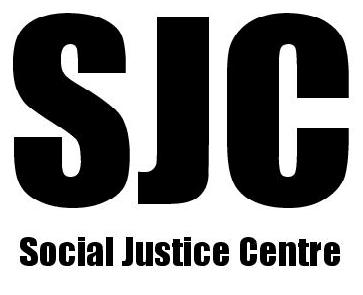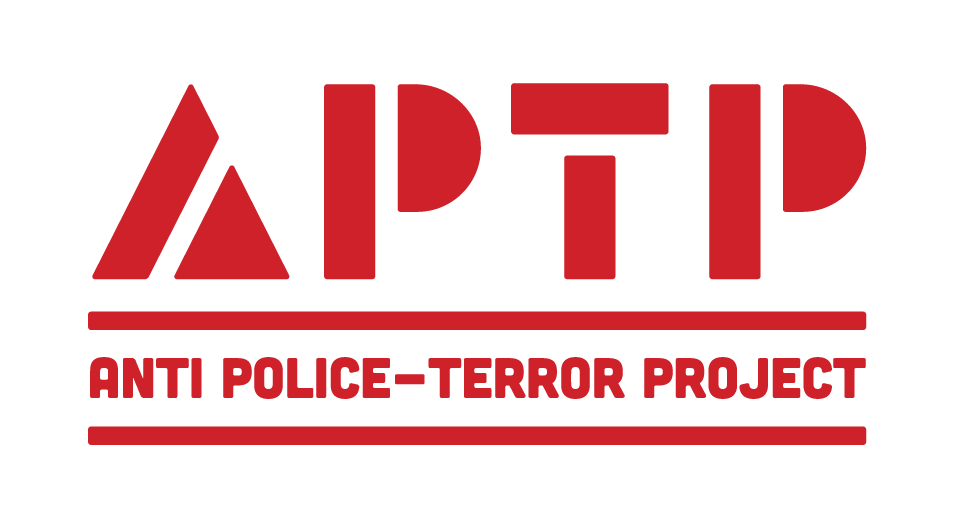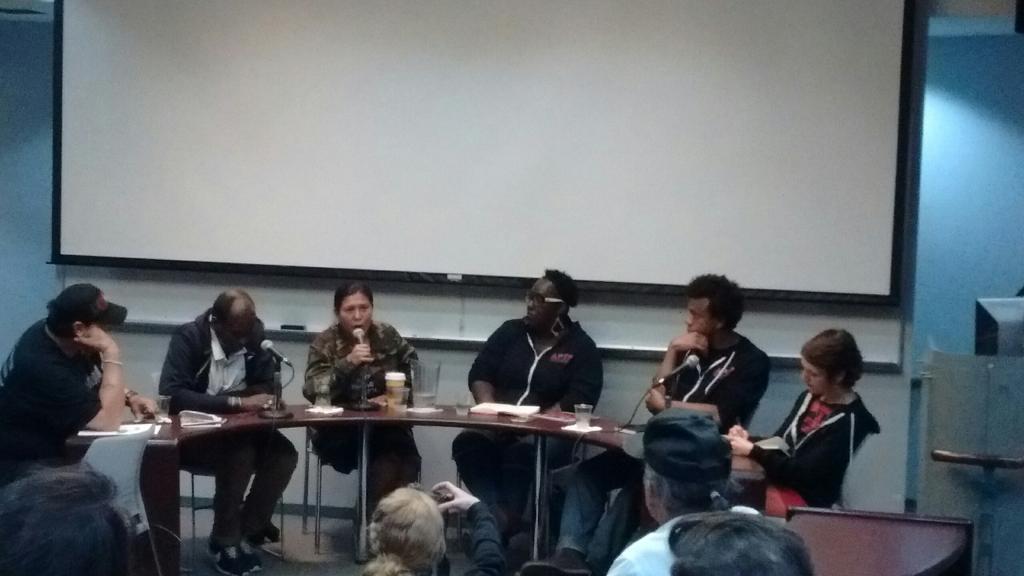July 1, 2018
By Jeff Shantz
There is a life and death necessity for exploited and oppressed people and communities to organize to stop police and to provide alternatives to state policing. One example of how this organizing work can be done effectively, as a starting point, is the Anti Police-Terror Project (APTP). APTP is a Black-led, multiracial, intergenerational coalition organizing to eradicate police terrorism in communities of color. In addition to supporting families of victims of police and organizing to stop police violence, they have created a first responders team to go to the scene of police killings to gather information, take pictures of the scene and, where needed, launch inquiries.
On June 29, 2018, organizers from APTP discussed their work in a session “Healing and Resistance in a Police State” at Simon Fraser University Harbour Centre. Presenters included APTP members Asantewaa, Annie Banks, and James Burch.
Anti Police Terror Project
Asantewaa began by outlining the history of APTP. She was working with Black August when Oscar Grant was murdered. She notes that following police killings there is an initial response of anger but then over time there is less focus on the killing, partly because people are poor and have to work and cannot dedicate all of their time to killer cops. Organizers have recognized the need for more durable infrastructures to maintain opposition to killer cops. Asantewaa states that the support for families is the backbone of the work that APTP does.
From the start they realized that it had to be Black led and that white allies had to accept that. She says they also had to be explicit and state openly, “Fuck the Police”—without any apologies. APTP have been clear consistently in pointing out that the police are expressions of state violence, of state terror. APTP has organized to impact and end state terror, not only to react to it.
In discussing the structure of APTP Asantewaa says they needed to create an infrastructure where anyone can plug in and get right to work. General meetings are monthly and there are active committees on: Policy, Media, Legal, Security, and First Responders. Security defends direct actions but also works to support families since police direct acts of harassment against victims’ families. The legal team defends arrestees but also does support for families.
The First Responders compile information after acts of police violence and also do community investigations. They interview people in the community who saw the acts of police violence. Through their work they have gotten cops to recant untruthful statements and accounts.
Within 24 hours of an act of police violence APTP hold a vigil. They act with intent. It gets people out talking about what happened and shows the police that the community knows and cares about what happened.
Annie Banks, the Director of Fundraising for APTP, joined the team in 2015. She has studied archived media and discusses how the police narrative typically changes from the time of killing to later reports throughout the day. She stresses the importance of taking direct leadership from families.
James Burch, the Policy Coordinator, discussed the multiple forms of work in APTP. He reiterates that work for families is the core of the work they do. They help families navigate a path to justice according to their own needs and terms. The aftermath of a police killing is a disempowering context so they need to work to empower families. Burch stresses the need to organize no matter how many people show up at first. You have to be there for the families.
Defund and Dismantle the Cops
APTP note that police departments get 30 to 50 percent of general funds in cities (that is discretionary budget funds) in the US. This is true also in the Canadian context. The money for social and community services is all in the police budgets. So how can police budgets be accessed to fund real community resources (not police associated public services). APTP note that cities in the US are facing bankruptcy crises. There is a need to get them cutting police budgets.
When asked how to dismantle police, James Burch suggests defunding them as a step. Go after their contracts. Put pressure on councils to negotiate contracts for fewer cops as a start. Show where the money could be better spent on real, community based, social and community services.
APTP has put together a guide to spread the work. People can pick up a guide and run a campaign themselves anywhere. It is a way for APTP to share the work they are doing. The guide includes information about laws that protect police across the United States; about police association contracts; a guide to police commissions; and a guide to defunding police.
There is also the issue of developing community alternatives to police and building transformative justice practices. The Audre Lourde group builds tools for communities so people do not call the cops on their neighbors. They work to deal with neighborhood issues directly and supportively rather than calling the cops. APTP stress the need to create systems to keep people safe and are working to do this. Our communities need informal systems to protect each other.
APTP also point out that folks with privilege need to harness and even weaponize their privilege and use it in spaces where less privileged people do not feel comfortable. Post-secondary faculty, especially criminologists, need to work to free their departments and campuses of cops.
APTP has had an impact such that cops in the East Bay now know that if they harm someone there will be consequences. There will be costs to the force, civil suits, etc. In San Francisco, where there is less such organizing, by comparison, cops kill with impunity. They have been conditioned to believe that they can kill with no response or cost of any kind. When police feel this , they expand their pressures socially and politically, to council, etc. They run the city.
A Local Need
In Surrey, the cops, the RCMP, run the city. The work that APTP are doing is work that is desperately needed in Surrey where the RCMP act like the occupying military force that they are. Where they extend their reach into all aspects of social life, creating a school to prison pipeline. Where they act, including people with impunity. Notably APTP organizers said that the policing situation in Surrey appeared worse than in Oakland. Work needs to be done to create a social context in which the RCMP cannot operate.
For more: http://www.antipoliceterrorproject.org




